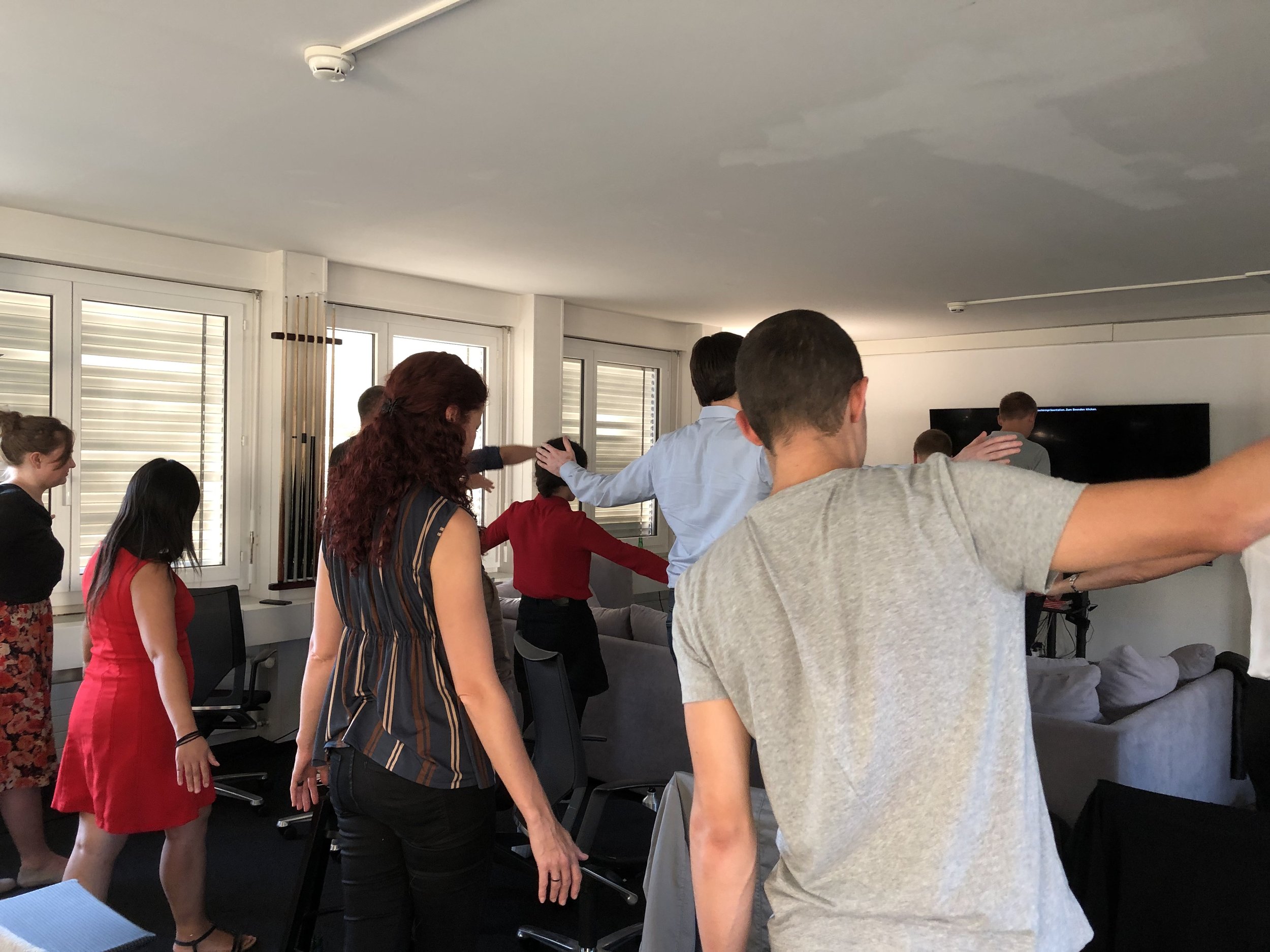#PoDojo Studio Zurich: Crazy Busy Product People. Hacks for Better Time & Stress Management
Building products is tough. For every role that is involved. The next release is coming, maybe you’re even launching a new product, all the new features have to be tested, somebody needs to write the Product Update or the launch email to your users, bugs need to be fixed, there are still some tickets untouched that need to go into that release, UX on that one new feature is still weird and quickly needs a decision to be made, the architecture has gaps that need to be fixed before the release, stakeholders are waiting for an update, management is putting pressure on that release because it has taken already 2 weeks longer than expected etc. etc.
Does that sound familiar? There’s always so much to do and no time to do everything.

#PoDojo Studio Zurich meetup
As this might be a situation to some of you and only happening from time to time, this can be a daily occurrence for others. Turns out, this is the reality for product people across different disciplines and branches. In our #PoDojo Studio Zurich meetup, we had a mixed group of roles: From Product Managers, Marketing Managers, Software Engineers, Freelancers in health care, consultants, to “It’s complicated”.During the evening, we first learned about the effects that stress has on the body from Elodie Caucigh. After the theory part, she shared breathing and moving exercises that can be practiced even at work to calm down again and control your stress level.
Next, we collected and voted on topics that the attendees would like to get tips on, written in a “How do you...” format, and exchanged ideas on these in a fishbowl discussion.
Below you can find the results of all the discussions during the meetup. The topics and the tips responding to the topics discussed during our fishbowl, during our talk and after the event during our apero.
We hope you find these useful. If you’re feeling stress, try one (or two) of the ideas below to see how they help you. And if you have other tips or tricks to help “crazy busy product people”, please do share back!
Tips on time & stress management from the participants of Crazy Busy Product People
How do you cope with times when stress has taken away all your motivation?
Short term demotivation
Go out for a walk, or go running
End that day and go home
Go to a place that makes you calm down
If it‘s something you can‘t change: stop caring about it. Lie to yourself by saying „it doesn‘t matter“. Your brain doesn‘t understand if that‘s true or not but will make you feel as it is true
Joke about the situation that caused demotivation and laugh about it. Laughing makes handling stress easier
Or just make yourself laugh as a sign to yourself that the situation won‘t take you down
Long term, or in general
Accept it - If it is not something you can change and you can make your peace with it without infringing your values.
Change it - Take deliberate action to change what is causing the stress.
Leave it - Leave the situation or job
How do you react when colleagues interrupt you while you're focusing on something, without coming across as unhelpful/unfriendly?
When they come over to you, remind them that you‘re deep into something now and to come later. Do that a couple of times, they will understand it at one point and be more careful approaching you.
When somebody asks in the hallway „Can I talk to you for a minute about something, now that I see you?“ say „Yes, let‘s talk in half an hour. I have to do something right now.“
Snooze Slack or turn it off so that others simply can‘t approach you, especially if it‘s a remote or distributed setup.
How do you switch off your brain after a tough day at work?
Go running / do exercises
Write down your thoughts at the end of the day. This helps to free up the space in your brain.
Get a massage, or get the Black Roll to make yourself a massage
When you‘re at home, lay down and put a warm towel on your face
Have a hobby
Take a different way home, shop in a different supermarket - change things up to give your brain something to do
How do you measure the “wasted time” without too much overhead?
You can use tools like the cube that tracks time
You can use tools like resqueme.com that records what you‘re doing on your computer and automatically analyses how much of your you have spent on what type of activity
Build a Lego tower: Whenever you feel you‘ve wasted time, add another Lego brick to your tower. Define what 1 Brick stands for.
Measure productive time instead. And the rest is wasted time.
Define what wasted and productive time actually mean. Having 1 hour lunch and 30 minutes coffee can be not wasted time you had come down after a tough morning.
Decide what‘s most important things that need to be done per month/week/day. If you‘ve done them, then you‘ve not had any wasted time

Bonus 1: How do you encapsulate/focus?
Block time in your calendar to work on a topic and really do it
Additionally, disappear physically. Book a room, go there, turn off slack completely and also email sync and focus on your work
Block general times for deep work. Either in the morning or in the afternoon, depends on when you are more productive in general. Make the blockers specific as soon as you know what topic you’ll need that time for. Even if it stays general it’s good time not spent in meetings.
Use the Pomodoro Technique to force yourself to stay focused for a period of time and reward yourself with getting things done
Bonus 2: ToDo list or not ToDo list?
If you‘re a person who needs todo lists and rather create them at the end of the day, decide on the most important and urgent things that needs to be done tomorrow and pursue that.
However, you might just be a person who gets stressed by todo lists. Then simply don‘t have any. Simply think about what needs to be done that day as a first thing in the morning, and also what you won‘t do that day or even at all. By the end of the day, don‘t think about what‘s left. Think about it the next day.
A standup-like shortlist can help. „What did I do yesterday? What am I going to do today?“ And do this every morning.
Bonus 3: 3 important things to get your act together before burnout
Make it very, very, very clear to your managers that it's too much. Make it clear that it's not the typical “we're all overworked anyway” situation but that you're genuinely suffering. If you don’t make this very clear, they won’t do the things that only they can do, e.g. hiring additional roles. They will only tell you that you have to live it. Make it super clear!
Say “no” to task. To the ones that come from others but also to the ones that you set yourself. Do only the things that are important. Challenge even the not important but oh so urgent tasks. Some of them are not urgent at all. And wait for your manager to ask you to do something twice before you do it. Then you know that it’s really important.
You don't have to be available 24/7. You have the feeling that you must be available. But you don't. Switch off work related apps and notifications (and even the number of unread notifications) so that you only see that something is happening when you check the app. You get to decide when you want to do that with no stress. And leave in time. You have a life.

